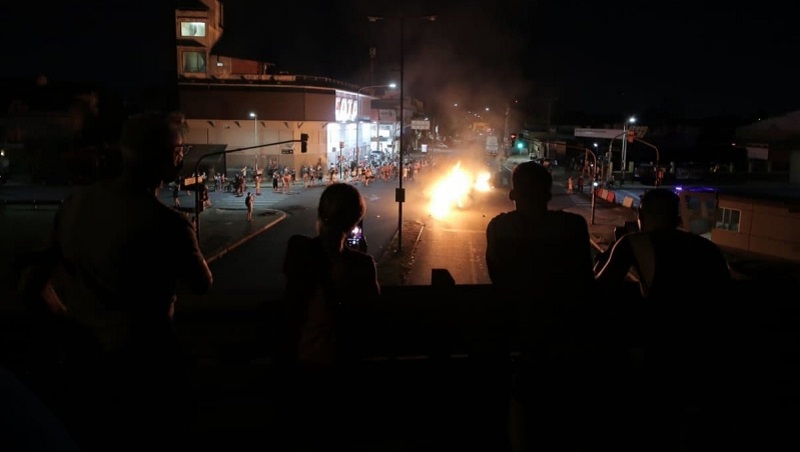
Food rotting in the fridge. Teeth and fists clenched with impotence. The suffocating heat that rises from the street, invading each of the rooms. Inhabit hell and frustration. How do you live in Villa Lugano without electricity and water?
“…the elevators don’t work, there are people who go up and down 12 floors by stairs. We also don’t have any food, since we can’t keep it in the fridge. Some neighbors, when the power goes out, are locked in the elevators. On Saturday, February 11, we were without electricity for 16 hours. On Sunday, February 12, they gave us electricity and cut it off every 30 seconds.”
In the blazing fire of the freeway, the rant emerged in the slum of the rich city. Picketed and was repressed. All just 20 minutes from the luxury building of Puerto Madero.
city of social and political contrasts; of the mirrored towers and the towers without light and without an elevator. City of different lives: more cared for and less cared for. Back in 2019, even before the pandemic dragged millions into greater misery, a study by the scientific journal The Lancet determined that in neighborhoods like Lugano the Life expectancy of the population was up to 6 years lower than in others such as Palermo, Belgrano or Recoleta.
That social abyss -badly despite a certain progressivism- it does not have anything properly Buenos Aires. It also unfolds, unquestionably, throughout the province of Buenos Aires. This is illustrated, for example, by that impressive neighborhood between shanty towns and country houses that inhabits the Buenos Aires suburbs.
At the international level, the last decades have witnessed a growing social unrest in the face of social inequalities arising from the development of cities. Increased in the heat of the neoliberal offensive, the gentrification and relocation processes implied a regressive transformation of urban space. The result?: citizenship first and citizenship second. Multiple processes of the class struggle have been fed from that frustration.
Collective action and individual departures
“If you don’t save yourself, nobody saves you”qualification The nation in the hours following the collective fury that flooded the Dellepiane Highway. Trying to portray the annoyance of neighbors, the aristocratic newspaper encouraged the ideological discourse of “every man for himself”. It operated, as always, sowing the idea of an “everyone against everyone” that, looking at it as a whole, would admit no other “solution” than the hobbesiano Strong state capable of imposing order.
Paradoxically, it was collective action that imposed a solution. Partial and precarious, but solution at last. Turned into a permanent picket, the cut on the Dellepiane Highway turned the claim into a political fact of public scope. She exposed to millions the sufferings of those thousands of inhabitants of the south of Buenos Aires. He turned the structural ineffectiveness of Edesur into a central issue on the media agenda. It forced the national government to announce a fine to the company and a modest intervention that does not affect profits or capital. Larreta’s obscene repression increased the scope of the protest. He magnified, before the cameras and before the country, the denunciation.
The national history -recent and not so much- appears inseparable from the social conflict and the occupation of public space. The protest – worker, popular, the women’s movement, youth – takes to the streets. The collective action imposes courses, brings bodies closer and unites wills.
The limits to a higher deployment of this activity lie, on too many occasions, in those who occupy the leadership of the so-called mass organizations. Where is, for example, the voice or the action of the union leaders in the face of massive power cuts? Are not those who live in Villa Lugano workers and workers?
The state, the private, the individual
He neoliberalism he bequeathed an imaginary anchored in individual “solutions” to the problems of everyday life; in the competition -fierce and not so much- of everyone against everyone to achieve a supposed success tied, also, to a supposed merit. The figure of the “entrepreneur” was an archetype of that ideology. Today the libertarian right of Milei and co. takes up that discourse in times of crisis and persistent social decline. When “being an entrepreneur” resembles, too much, the most extreme job insecurity.
The disillusionment with the self-styled progressive governments works in your favor. Those efforts that, postulating a discourse of the “present State”, defrauded the illusions of millions and, in doing so, also sowed skepticism to everything that smelled or sounded like collective exit.
The reactionary right feeds on a disappointment that is not purely ideological. For the concrete experience of millions, the “Present State” is equivalent to the almost complete lack of protection in essential aspects such as health, education or public services.
The darkness in the streets of Lugano illuminated the nullity of the state against Edesur and the privatization scheme. The alleged official harshness was reduced to the incorporation of technical overseers in business management. The noise of the threats was followed by a tepid fine. It is almost a caress compared to the debt forgiven barely a month ago: the second amount is 66 times higher than the first. For political power, the capitalist profitability is untouchable.
Hours later, in a strange confession, Gabriela Cerruti stated that Edesur “has been mistreating consumers for years.” TRUE. In an act of leso neoliberalism, the State granted the service concession in 1992 for the absurd period of 95 years. Until 2087. How many more years do you have to endure private mistreatment?
Empty speeches; words at the wrong time The presidential spokesperson speaks as if Peronism had just taken office; as if Kirchnerism had not led the State for twelve long years, making “the state” its banner against the so-called corporations.
That statehood was poor; flimsy. Born in times of post-neoliberalism, she bowed respectfully to the menemista inheritance. With few exceptions, he accepted the State of affairs received. It is true that he came to control companies such as YFP and Aerolíneas Argentinas. He did, however, when the capitalist waste it was already obscene. Contesting their own speecheshe put dollar for dollar to compensate those who had emptied and destroyed those companies.
The State “really” present
In periods of deep national crisis there are no “individual solutions” that reach large majorities. He Entrepreneurship works like a luxurious illusion, allowed to a few. For millions, self-employment equates to a growing deprivation of time and rights.
We also pass adjustment times. scissors in hand; dutiful servant of the IMF, Sergio Massa censures all deemed “unnecessary” spending in Washington. The Front of All unites to endorse it. The “present state”, a campaign resource, does not transcend the world of words.
There is not, however, a State that is truly attentive to the needs of the vast majority within the limited framework of capitalism. In a world marked by antagonisms between social classes “the irons” of the state machinery are in the hands of the most powerful fraction of the ruling class. The state is “your state”.
That imposes a task on all politics who intends to bet on the collective exits; that of proposing a profound transformation of the social structure, overcoming the narrow limits of the capitalist world.
Source: www.laizquierdadiario.com

